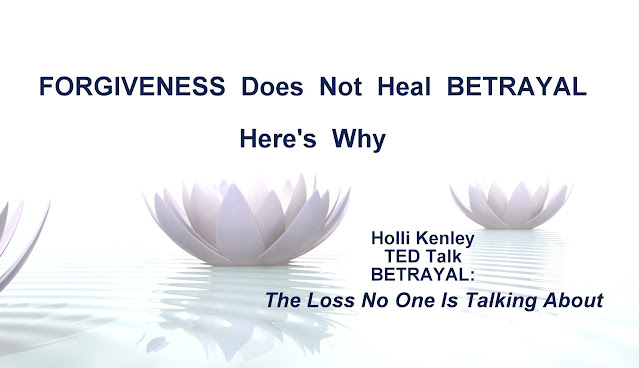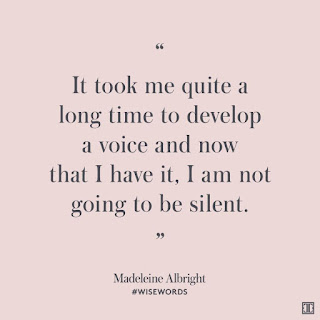Forgiveness Does Not Heal Betrayal: Here's Why
Recently I gave a TED Talk - BETRAYAL: The Loss No One Is Talking About. At the beginning of the talk I asked the audience two questions:
"If you have ever felt betrayed, have you been told to give it time, to trust again, or to forgive? And if you tried any of those things, have you felt better....or bitter?"
With over ten thousand hours in session as a Licensed Marriage and Family
Therapist working with clients healing from betrayal, I've heard from hundreds
of individuals who have wondered why they still are stuck in the pain of their
betrayal injury, even after they have forgiven their betrayer/s.
Based on years of researching and analyzing betrayal and on my professional
experience, I believe Forgiveness Does Not Heal Betrayal. Here's Why.
Healing From Betrayal - Concept #1
Practicing forgiveness may release the hold the betrayer has on you.
But it does not heal the betrayal wound.
I want to acknowledge that practicing forgiveness holds deep meaning in many
faiths, spiritual practices, and it is a sacred ritual incorporated in a myriad
of cultures and belief systems. When we have been betrayed by someone or
something, we experience unspeakable anger, resentment, and even hatred. If we
do not let go of these painful feelings, we are held hostage by them. We are not free from them or our betrayer/s. Practicing forgiveness is a gift to ourselves
– releasing us from our betrayer/s and filling us with peaceful acceptance.
At the same time, based on my research and experience, practicing
forgiveness does not heal the betrayal wound.
And this is where many individuals feel stuck and wonder what is wrong
with them. Yes, they have forgiven their betrayer/s. But, there is still a
wound festering inside.
As I share in my TED Talk, when we are betrayed, we experience a loss that is rarely discussed - the Loss of Self. And, unless and until this beatrayal wound - the Loss of Self - is accessed, acknowledged, and addressed, we will remain stuck in our betrayal pain. Recovering the Loss of Self is hard work. The Loss of Self is comprised of deeply inner-personal losses that are typically buried beneath layers of shame. It is painful to talk about them.
For example, have you ever experienced any of these deeply inner-personal losses?
Innocence and Identity
Reputation and Role
Privacy and Safety
Self-Esteem, Self-Worth, and Self-Respect
Human Dignity and Human Rights
Being Seen and Being Heard
Thus, while it is important to practice forgiveness and release your
betrayer/s, I want you to know that your journey to recovery from betrayal does
not end there. There is much work to do.
In my book Breaking Through Betrayal: And Recovering The Peace Within (2nd Edition), I provide readers with a comprehensive process for healing from any kind of betrayal injury. The first part of the book “Breaking Through Betrayal” begins the process for recovering your Loss of Self.
Healing From Betrayal - Concept #2
There is another component to consider when it comes to forgiveness and its
relationship to healing from betrayal. Although there are times when
forgiveness provides immediate and lasting relief, most of us who practice
forgiveness have experienced that it is not a “one and done” kind of thing. We
may feel release for a while, and then when our pain resurfaces, we need to
forgive again. And again. This is to be expected.
However, with betrayal, there are two conditions that complicate the healing
process and that are not resolved through practicing forgiveness.
First, for numerous reasons, many individuals choose to be in relationship
with their betrayer/s. For example, currently in my private practice, at least
two-thirds of my clients want to be in relationship with a member or members of
their family who have betrayed them. Even though they have forgiven their betrayer/s,
they often find themselves being re-betrayed by them.
A second condition that complicates the healing process is when individuals are required to be in situations or circumstances in which they find themselves coming face to face with their betrayer/s. For example, clients may have to appear in court to testify in the betrayer’s presence. Or, I’ve worked with many clients who must return to their place of work – facing their betrayer/s on a daily basis. Some clients experience on-going betrayals. Others struggle with triggers in their betrayal enviornments, leaving them feeling re-betrayed.
With both of these conditions, individuals who have forgiven their betrayer/s but who continue to feel re-betrayed blame themselves. Clients have reported to me that they feel tremendous shame and that “something is wrong with them.” There is, of course, nothing wrong with them.
Does this mean that we can’t have relationships with our betrayer/s or
return to our betrayal environments? There is no absolute answer. It depends on
each individual and the complex injurious nature of each betrayal. However, I
do know this with certainty.
Practicing forgiveness may release the hold the betrayer has on you.
But it does not provide you with healing that is well-integrated into your being nor prepare you
with strategies required for being in relationship with your betrayer/s or
navigating your betrayal environment.
Although we can never eliminate being re-betrayed, we can lessen its injurious impact on us. However, there is much
healing work to be done. In Breaking Through Betrayal: And Recovering The Peace Within (2nd Edition) , the second part continues
your work in recovering the Loss of Self. And, it also guides you as you
learn how to integrate a series of sound, well-researched strategies into your healing
process.
In closing, betrayal is a complicated and complex trauma. You might feel
frustrated after giving yourself time or trying to trust again. Or you might
feel it is your fault that forgiveness has not provided the relief you have
been seeking. After fifteen years of helping others to heal their betrayal
wounds and in doing my own recovering work, I share these truths with you.
Forgiveness allows us to release our betrayer/s.
Healing our betrayal wounds releases our pain
as we recover ourselves along the way.




Comments
Post a Comment